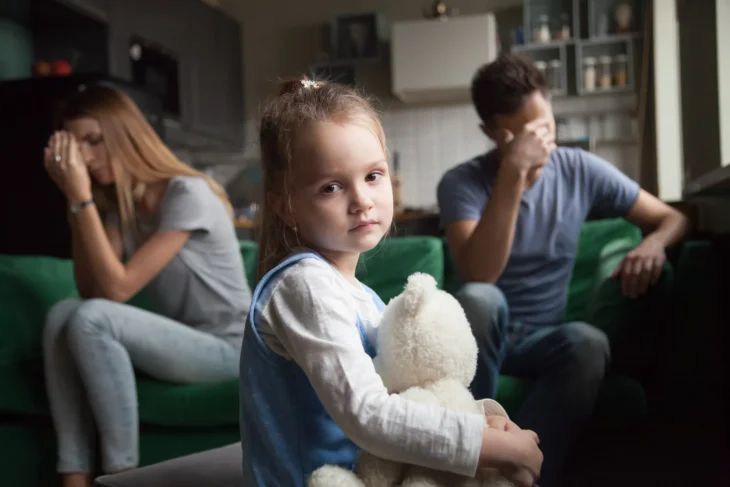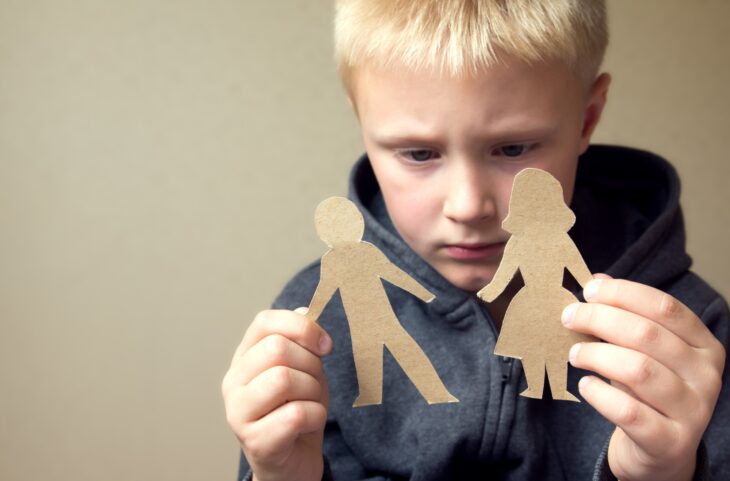Managing divorce with children involved can be tricky, even if you’re leaving your marriage with their best interests in mind. Young people of all ages are affected by divorce so it’s important to understand their feelings and know how to manage situations as well as you can. Here’s some golden ‘rules’ to help you, help your child.
Contents
Appreciate that change is hard for children
A new step parent, a new home or possibly a new school can be a daunting prospect for children who thrive off regular routine and structure. When things change it can be stressful and anxiety inducing. Your child may feel overwhelmed, angry and they may even blame themselves for what’s happening. When children don’t know what will happen next, they can exhibit a range of different but strong emotions. Keep up routines and be consistent to give them that sense of stability. Some children adapt to change more easily than others so be aware of your child’s own personality and character.

Source: usatoday.com
Be honest with them
Children have a moral right to know what is happening in their lives so it’s important to be truthful, without giving them a full breakdown on the details of your divorce. Think first before you speak to them, and plan ahead what you are going to say and how you are going to say it. Choose a good time when they are more likely to be engaged in your conversation and be really clear about what will be happening. This not only provides reassurance but it also builds trust with your child in the long-term. Keeping things from them or concealing the truth about what is going on could cause your child to doubt you on other matters in the future.
Understand their responses
Age and different personalities impact the way a child responds to their parents splitting up. Very young children may regress to wetting the bed or revert back to wanting a dummy or being clingy. Assure them with your consistent presence and if you are sharing parenting, be transparent when you are going to see them again. Teenagers and adolescents may become inhibited, get into trouble at school, act antisocially or their academic performance may decline. Help older children with their feelings by talking to them and allowing them to express their anger, fear or resentment, while making sure boundaries are in place too.
Explain that both their parents love them
Telling your children how much you love them is probably the most important thing you can say to children during a divorce. If your separation is fresh then talking to your children about what is happening can be especially difficult. But simply saying ‘I love you’ has a profound effect when children are feeling insecure about their family relationships. It’s also wise to remind them that their other parents love them too. This will reinforce the idea that the divorce in no way as a result of anything they have done. Reassuring them with your love can be a gentle way of getting them to open up and talk about any concerns they have about the situation too.

Source: allprodad.com
Communicate well with your ex-spouse
Effective communication with your former spouse is not always straightforward but it makes all the difference to your child. Witnessing a fight or dispute between their parents can make children feel as if they are to blame for the conflict. Don’t make them party to conversations you are having about your ex-spouse with friends or other family members either. Whether intended or not, putting your children in the middle of conflict or discussions can leave them compromised, and even depressed. Make a rule with your ex that you won’t discuss divorce proceedings with the children around and you will not invite them to share their opinions on their other parents.
Continue to participate in your child’s life
Your child needs to know very clearly that you will still be there for them. Explain this to them with your words and back it up with your actions. Making time for your child shows that your relationship will stay the same even though there will be significant changes. Also understand that your child needs to know it is good to spend time with their other parent. Encourage the fun things they do with them by talking about it and asking them questions. Setting a good example on how to handle difficult situations will be a valuable lesson they will appreciate when they become an adult.
Help them place personal boundaries
Older children may have fears about how to talk about your divorce to their friends and peers at school. Explain to your child that they are under no obligation to talk about what is happening, and they can refrain from doing so, firmly but politely. Having this conversation is also a good opportunity to explain the importance of setting personal boundaries with people – a skill that will be helpful throughout their lives. It is also often useful to speak to your child’s teachers or their friends’ parents so they have a good understanding of where your child is in terms of your separation. In many instances, the school may offer support services such as counselling or support groups.

Source: medium.com
Finally, look after yourself too
A content parent is a positive force for a child experiencing their parents’ separation, helping them to feel encouraged and secure through your attitude and your actions. It can be easier said than done when you are challenged with the issues and conflicts that often come with a divorce. Take simple steps by ensuring you keep up with friends, continue to participate in and enjoy your hobbies and interests as much as you can, and make time for good sleep, exercise, healthy eating and periods where you can simply relax. Setting new life goals can offer a new perspective for your future too. These small efforts can help you feel more optimistic, provide welcome distractions from stress and ultimately, help you and your child with your emotional well-being.
